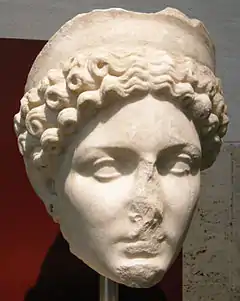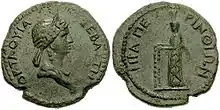Claudia Octavia
Claudia Octavia (late 39 or early 40 – 8 June 62 AD) was an empress of Rome. She was the daughter of the Emperor Claudius and stepsister and first wife of Emperor Nero.
| Claudia Octavia | |||||
|---|---|---|---|---|---|
 Portrait head of Claudia Octavia, National Museum of Rome | |||||
| Roman empress | |||||
| Tenure | 13 October AD 54 – 8 June AD 62 | ||||
| Born | late AD 39/early AD 40 Rome | ||||
| Died | 8 June AD 62 (age c. 22) Pandateria | ||||
| Spouse | Nero | ||||
| |||||
| House | Julio-Claudian | ||||
| Father | Claudius | ||||
| Mother | Valeria Messalina | ||||
| Roman imperial dynasties | |||
| Julio-Claudian dynasty | |||
| Chronology | |||
| Augustus | 27 BC – AD 14 | ||
| Tiberius | AD 14–37 | ||
| Caligula | AD 37–41 | ||
| Claudius | AD 41–54 | ||
| Nero | AD 54–68 | ||
| Succession | |||
| Preceded by Roman Republic |
Followed by Year of the Four Emperors | ||
Life
Family
Octavia was the only daughter of the Emperor Claudius by marriage to his third wife, Valeria Messalina. She was named for her great-grandmother Octavia the Younger, the second eldest and full-blooded sister of the Emperor Augustus. Her elder half-sister was Claudia Antonia, Claudius's daughter through his second marriage to Aelia Paetina, and her younger brother was Britannicus, Claudius's son by Messalina.
Early life
She was born in Rome around 39 or 40, shortly before the assassination of Caligula, and her father's subsequent accession to the throne. Her brother, Britannicus, was born soon after, in 41. As a young girl, her father betrothed her to future praetor Lucius Junius Silanus Torquatus, who was a descendant of Augustus.
Rise of Nero
In 48, her mother was executed for conspiring to murder her father, the emperor Claudius, who subsequently married his niece (and Octavia's first cousin) Agrippina the Younger. Agrippina's son, from her first marriage, was Nero (birth name Lucius Domitius Ahenobarbus).
Agrippina, through her plotting and manipulating, ended the engagement between Octavia and Lucius Silanus and persuaded Claudius to adopt Nero as his son and heir, and arranged for Octavia and Nero to marry on 9 June 53.
Life as empress
Claudius died on 13 October 54 and Nero succeeded him as emperor. In early 55, Britannicus died suddenly, likely poisoned on Nero's orders, as he represented a substantial threat to Nero's claim to the throne. According to Tacitus, both Octavia and Agrippina were present at the meal at which the poisoning took place, and were equally shocked. He states that from this moment Octavia became very unhappy, but learned to hide her affections and feelings around her husband/stepbrother. Octavia was caught up in the power struggles between Nero and his mother, which ultimately concluded when Nero murdered his mother in March 59.
Although she was admired as empress by the Roman citizen body, the marriage was deeply unhappy on a personal level. Octavia was an ‘aristocratic and virtuous wife' (in Tacitus's words), whereas Nero hated her and quickly grew bored with her (according to both Tacitus and Suetonius), trying on several occasions to strangle her (according to Suetonius) and having affairs with a freedwoman called Claudia Acte and then with Poppaea Sabina. He excused this treatment of her when his friends showed their concerns about it. When Poppaea became pregnant with Nero's child, Nero divorced Octavia, claiming she was barren, and married Poppaea twelve days after the divorce.
Banishment and death

.jpg.webp)
Nero and Poppaea then banished Octavia to the Campania region, and eventually to the island of Pandateria (modern Ventotene) on a false charge of adultery with Nero's former tutor Anicetus. When Octavia complained about this treatment, her maids were tortured to death.
Octavia's banishment became so unpopular that the citizens of Rome protested loudly, openly parading through the streets with statues of Octavia decked with flowers and calling for her return. Nero (badly frightened) nearly agreed to remarry Octavia, but instead he signed her death warrant.
A few days later, Octavia was bound and her veins were opened in a traditional Roman suicide ritual. She was suffocated in an exceedingly hot vapor bath. Octavia’s head was cut off and sent to Poppaea. Her death brought much sorrow to Rome. According to Suetonius, years later Nero would have nightmares about his mother and Octavia.
In later fiction
Her sufferings, and her divorce from Nero, are the subject of Octavia, a play by an anonymous author written sometime after Nero's death which dramatises Octavia's misery in her final days. More recently, she appears in Handel's lost opera Nero, Claudio Monteverdi's opera L'incoronazione di Poppea (1643), Reinhard Keiser's opera Octavia (1705), and Vittorio Alfieri's tragedy Ottavia (1782). Octavia is also the subject of the massive German novel Die Römische Octavia (1677-1707) by Anthony Ulrich, Duke of Brunswick-Wolfenbüttel, and a character in Robert Graves's novel Claudius the God (the sequel to I, Claudius) and the television series I, Claudius. She is the main character of "Octavia: a tale of ancient Rome," by Seymour Van Santvoord, published in 1923, which paints her as a Christian.
In Duncan Sheik and Steven Sater's musical, Nero, she is portrayed as mute, only singing in interior monologue. In the reading at Vassar, she was played by Lea Michele. She was played as a frightened, unwilling bride. She was very close to her brother Britannicus, played by Michael Arden.
Notes
Sources
- Suetonius – The Twelve Caesars – Claudius and Nero.
- Tacitus – The Annals of Imperial Rome.
References
| Wikimedia Commons has media related to Claudia Octavia. |
- E. Groag, A. Stein, L. Petersen – e.a. (edd.), Prosopographia Imperii Romani saeculi I, II et III, Berlin, 1933 – . (PIR2)
- Levick, Barbara, Claudius. Yale University Press, New Haven, 1990.
- Barrett, Anthony A., Agrippina: Sex, Power and Politics in the Early Roman Empire. Yale University Press, New Haven, 1996.
| Royal titles | ||
|---|---|---|
| Preceded by Agrippina the Younger |
Roman empress 54–62 |
Succeeded by Poppaea Sabina |